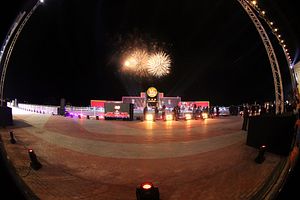CHOLPON-ATA — Kyrgyzstan, after a significant but rough week, threw itself fully into the 2nd World Nomad Games with a lavish opening ceremony, followed by earnest competition, friendly contests and a full-on Central Asian Burning Man-like festival.
Four hours east of Bishkek, where a Chinese embassy was attacked last week, at the lakeside resort town of Cholpon-ata, the 2nd World Nomad Games kicked off on September 3. Security was tight for the opening ceremonies, with a cordon along the main road, a second level inside the parking lot and a third–complete with bomb-sniffing dogs–for journalists inside the side gate. Getting in for some was a matter of lists and phone calls.
The three-hour-long opening ceremonies included a sweeping overview of Kyrgyz history and an Olympic-style parade of nations, headed by the guest of honor, Steven Seagal. Seagal, whose star has faded in the West, enjoys a cult-like following in the former Soviet Union. Westerners can’t seem to figure out the appeal, but the audience at the 10,000 seat hippodrome in Cholpon-ata went wild when Seagal appeared on horseback, dressed as a khan in armor. The hippodrome is new and impressive, though the bathrooms are unfinished.
“If Genghis Khan were alive, he’d be here,” the announcer boomed into the full arena.
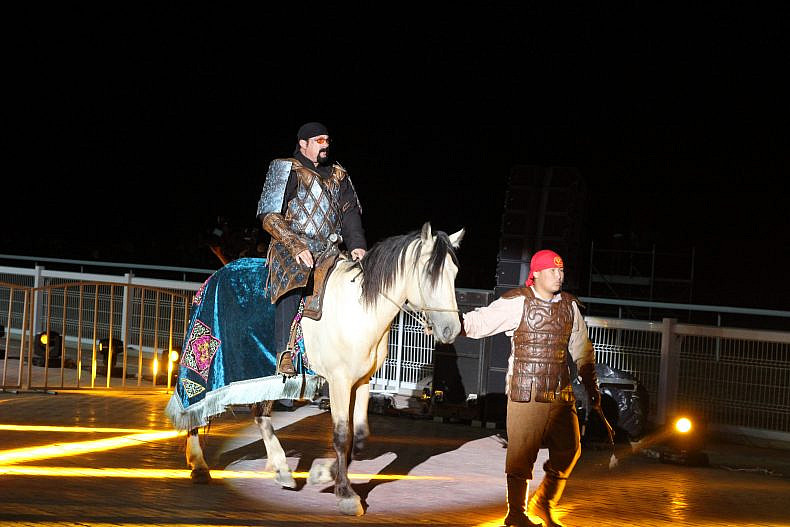
Steven Seagal rides a horse into the World Nomad Games. Photo by Catherine Putz.
The earnest competition, taking place in the sports and recreation center proudly bearing the Gazprom name, began before the opening ceremonies with the World Championship for mas-wrestling. Mas-wrestling is essentially a tug-of-war over a small stick. The ethnosport has found increasing popularity in the West in conjunction with strongman competitions but enjoys broader appeal in Eurasia.
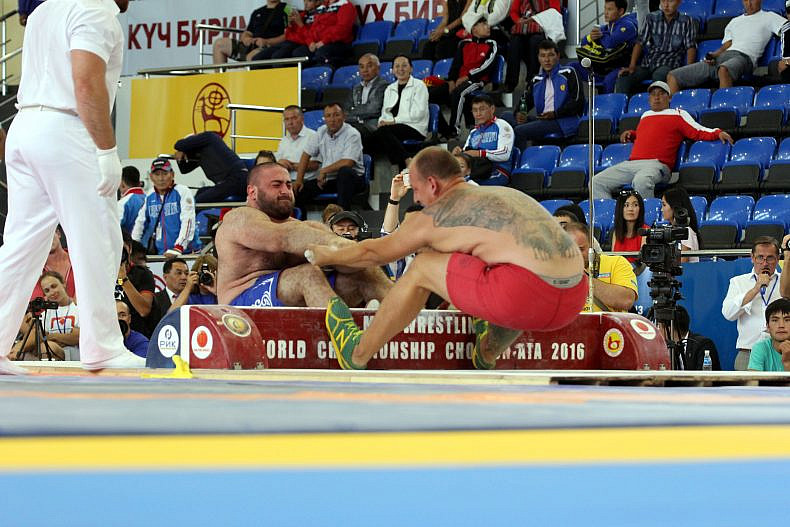
Mas-wrestling: fighting over a short stick. Photo by Catherine Putz.
It was at the mas-wrestling that a jacket for Uzbekistan appeared–a country that had not been advertised as participating in the Nomad Games this year amid increased border tensions with Kyrgyzstan. Later, during the parade of nations, Uzbekistan’s team was invisible. Some teams–like Norway and the Democratic Republic of the Congo–had Kyrgyz volunteers marching in the place of the nation’s few athletes, but Uzbekistan had no one.
The World Nomad Games opening was the same day as the funeral for Islam Karimov, Uzbekistan’s first and only president. The country’s athletes were absent due to the nation’s mourning, organizers explained.
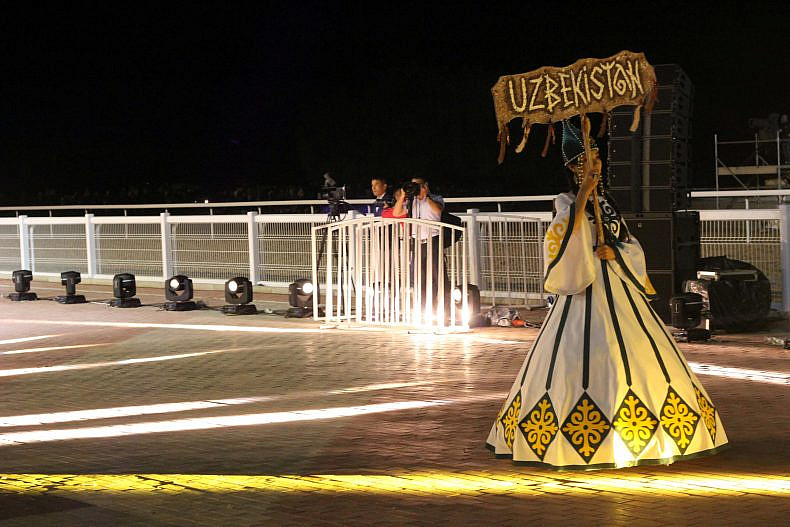
Other countries had Kyrgyz volunteer stand-ins (always in yellow shirts) but team Uzbekistan was absent for mourning. Photo by Catherine Putz.
Beyond the mas-wrestling, the first day of competition was at times more demonstrative and friendly. The first Kok-boru game–known as Buzkashi in Afghanistan and translating to “blue wolf” in Kyrgyz*–was between one of the Russian teams and a group of intrepid Americans, only one of which had ever played the game before.
Kok Boru is a violent and exciting game, akin to polo–except instead of a ball the players attempt to score by picking up, carrying, and tossing a goat carcass–the head and hooves removed–into a circle at the opposite end of the field. The goat is traditionally slaughtered right before the game and delivered to the village elder after. It is not a game for the squeamish, but one of immense importance in the Central and South Asian region. The Kyrgyzstan vs. Afghanistan game later this week is expected to be exciting.
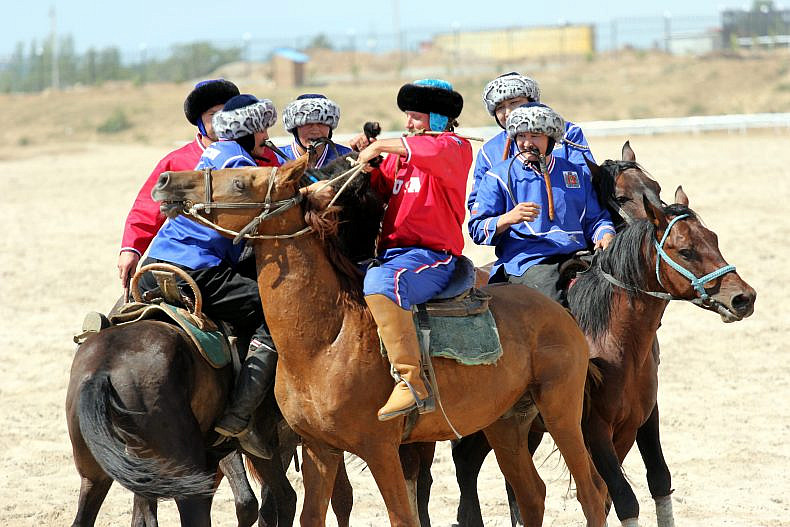
A Russian player (in blue), helps an American (in red) hoist the heavy goat carcass onto his horse. Photo by Catherine Putz.
The Russians were actually ethnic Kyrgyz, but as Kyrgyz President Almazbek Atambayev promised in his introductory speech the games were meant to surpass petty concerns of politics. Defying geopolitical expectations the game, the two teams were incredibly diplomatic–with Russian players holding onto the shirts of the Americans so they didn’t fall off their horses when they swung down to grab the goat.
About 45 minutes away from the hippodrome in Cholpon-ata, in a jailoo–a summer pasture–called Kyrchyn, about 200 yurts have been erected. On the first day of the Games the parking lot was pure Central Asian madness. Across a small stream–crossed either on horseback on via a muddy path that led to one of three shipping-container bridges–the yurt camps are divided into Kyrgyzstan’s seven regions plus the two largest cities: Bishkek and Osh.
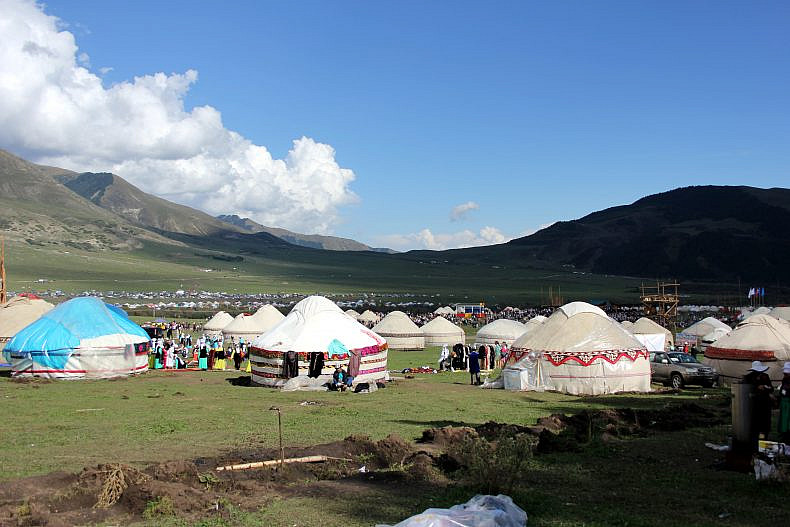
Kyrchyn jailoo–a summer pasture, filled with yurts and people from all of Kyrgyzstan. Photo by Catherine Putz.
The yurt camps are vibrant and active, with constant performances or rehearsals that seem to ascribe to no particular schedule. Wandering through, you’re just as likely to be drawn to a demonstration of a traditional crafts–like weaving or felting–or beckoned into a yurt for a private performance and a cup of kumys (fermented mare’s milk). A little Russian or Kyrgyz goes a long way, through many of the young volunteers know a decent amount of English and most are happy to put what they’ve learned in school to use.
The World Nomad Games are an opportunity for Central Asia to not just showcase its heritage and culture, but truly share it. There is much to be desired in terms of logistics for the Games: Cholpon-ata needs sidewalks, the organizers could handle the press better, the various security services and ministries could communicate better, and a semi-reliable schedule would be ideal. But there’s nothing more gorgeous than a thundercloud broken by a mountain, as exciting as a Kok-boru match, or as unexpectedly wonderful as being beckoned behind a yurt by a babushka for stew while she sips beer with friends.
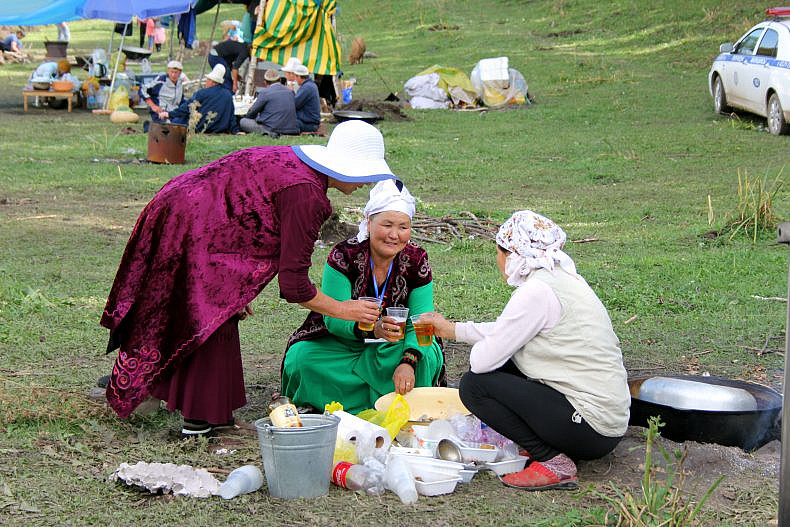
For many, the Nomad Games are a chance to sell strangers some stew and share a drink with friends. Photo by Catherine Putz.
*Correction: Kok-boru means “blue wolf” not “grey wolf.”













